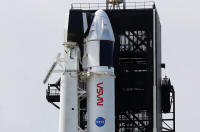SpaceX launch of crew on first 'operational' mission delayed by weather
 Send a link to a friend
Send a link to a friend
 [November 14, 2020]
By Joey Roulette [November 14, 2020]
By Joey Roulette
WASHINGTON (Reuters) - NASA and high-tech
entrepreneur Elon Musk's rocket company SpaceX announced on Friday a
24-hour weather delay of their planned launch of four astronauts into
orbit for NASA's first full-fledged human mission using a privately
owned spacecraft.
The liftoff time slipped from Saturday to Sunday evening due to
forecasts of gusty, onshore winds over Florida - remnants of Tropical
Storm Eta - that would have made a return landing for the Falcon 9
rocket's reusable booster stage difficult, NASA officials said.
SpaceX's newly designed Crew Dragon capsule, dubbed "Resilience" by its
crew, was rescheduled for launch atop the Falcon 9 at 7:27 p.m. Eastern
time on Sunday (0027 GMT on Monday) from NASA’s Kennedy Space Center in
Cape Canaveral.
The crew for the flight to the International Space Station includes
three American astronauts - Victor Glover, Shannon Walker and the
mission commander, Mike Hopkins, a U.S. Air Force colonel who is to be
sworn into the fledgling U.S. Space Force once aboard the orbiting
laboratory.

The fourth crew member is Japanese astronaut Soichi Noguchi, making his
third trip to orbit after flying on the U.S. space shuttle in 2005 and a
Russian Soyuz spacecraft in 2009.
The journey to the space station - lengthened from about eight hours to
a little over a day by the new launch time - is considered SpaceX’s
first "operational" mission for the Crew Dragon.
A so-called test flight of the vehicle to and from the space station
with two crewmen aboard the Dragon in August marked the first space
flight of NASA astronauts launched from U.S. soil in nine years,
following the end of the shuttle program.
NASA officials only just signed off on Crew Dragon’s final design
earlier this week, capping a nearly 10-year development phase for SpaceX
under the space agency’s public-private crew program.
The advent of the Falcon 9 and Crew Dragon represents a new era of
commercially developed space vehicles - owned and operated by a private
entity rather than NASA - being used to carry Americans into orbit.
[to top of second column]
|

A SpaceX Falcon 9 rocket, topped with the Crew Dragon capsule, is
readied to carry four astronauts on the first operational NASA
commercial crew mission at Kennedy Space Center in Cape Canaveral,
Florida, U.S., November 13, 2020. REUTERS/Joe Skipper

"The history being made this time is we’re launching what we call an
operational flight to the International Space Station," NASA chief
Jim Bridenstine said at a press conference at Kennedy Space Center
on Friday.
Musk, the billionaire Silicon Valley titan who also is chief
executive of electric carmarker and battery manufacturer Tesla Inc,
usually attends high-profile SpaceX missions in person. But his
presence for the launch was thrown into question on Thursday after
he said he had taken a series of four coronavirus diagnostic tests,
with two coming back positive and two negative.
Asked if Musk would be in the launch control room for liftoff,
Bridenstine said agency policy required employees to quarantine and
self-isolate after testing positive for the disease, "so we
anticipate that that will be taking place."
Whether Musk came into contact with the astronauts was unclear but
unlikely since the crew has been in routine quarantine for weeks
prior to the flight.
NASA contracted SpaceX and Boeing in 2014 to develop competing space
capsules aimed at replacing the shuttle program that ended in 2011
and weaning the United States off dependence on Russian rockets to
send U.S. astronauts to space.
Boeing’s first crewed test mission with its Starliner capsule is
planned for late next year.

(Reporting by Joey Roulette; editing by Bill Tarrant and Leslie
Adler)
[© 2020 Thomson Reuters. All rights
reserved.] Copyright 2020 Reuters. All rights reserved. This material may not be published,
broadcast, rewritten or redistributed.
Thompson Reuters is solely responsible for this content. |